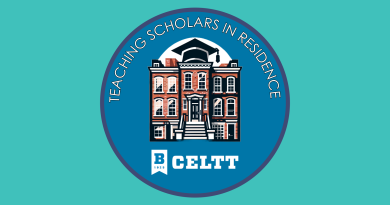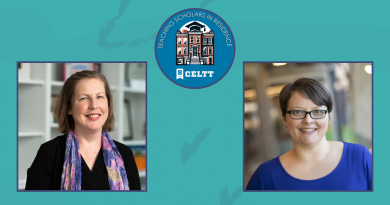Teaching Excellence in Action: A Glimpse into TSiR’s Impact
The Teaching Scholars in Residence (TSiR) program at the University of Baltimore continues to redefine excellence in teaching and learning, engaging faculty in the Scholarship of Teaching and Learning (SoTL) while creating an interdisciplinary community dedicated to educational innovation. This semester, our TSiR scholars took center stage at CELTT’s Teaching and Learning Day, sharing transformative research projects that are reshaping our classrooms.
Megan Rhee (CAS) presented her work on labor-based assessment, exploring whether this approach leads to a more equitable and engaging student experience. Using both quantitative and qualitative data, she is analyzing the impact of “ungrading” on intrinsic motivation in a creative classroom. Shelly Clay-Robison (CPA) shared her research on transformative pedagogy and how it influences critical thinking, employing narrative analysis of student reflections and archival research to understand this dynamic. Sunny Sanwar (MSB) discussed his research on the role of teamwork in fostering creativity, using the SCAMPR framework to analyze the evolution of business ideas in undergraduate and graduate courses. With individual data collection complete and team-level data in progress, his study evaluates creativity in terms of desirability, feasibility, and viability. Liz Keyes (LAW) highlighted her project focusing on the Socratic method in legal education. Having conducted interviews with faculty and received IRB approval, she is exploring how this teaching technique is defined and used, while planning classroom observations for the spring.
Our TSiR cohort is now taking their work on the road, proposing to present at Georgia Southern University’s SoTL Commons Conference next spring. This presentation will highlight the program’s dual impact: advancing individual SoTL research and fostering a culture of teaching excellence at UBalt through cross-disciplinary collaboration. The TSiR program addresses the need for sustainable SoTL engagement, with participants serving as independent researchers, mentors, and advisors to CELTT. Through structured feedback and reflective practice, they are creating a replicable model for how universities can support SoTL-informed teaching practices that enhance student engagement. The “Teaching Allies” initiative is one example of how the TSiR program will extend its impact beyond individual projects, fostering a network of peer mentors across the university. By sharing these experiences at the SoTL Commons Conference, UBalt will contribute valuable insights into sustaining interdisciplinary SoTL communities.
As we celebrate our current TSiR scholars’ achievements, we are thrilled to announce that applications for the next cohort are under review. Stay tuned for the big reveal before the spring semester begins! We are eager to introduce another group of passionate faculty ready to push the boundaries of teaching and learning at UBalt. Follow along with TSiR’s journey and keep an eye out for the exciting developments ahead.


